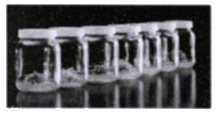The number of bacteria in a certain culture doubles every hour. If there were 30 bacteria present in the culture originally, how many bacteria will be present at the end of 2nd hour, 4th hour and nth hour?
To solve the problem of how many bacteria will be present at the end of the 2nd hour, 4th hour, and nth hour, we can use the concept of geometric progression (GP).
1. Identify the Initial Condition:
The initial number of bacteria in the culture is given as 30.
2. Understand the Doubling Process:
The number of bacteria doubles every hour. This means that after each hour, the number of bacteria is multiplied by 2.
3. Define the General Formula:
The number of bacteria at the end of n hours can be expressed using the formula for the nth term of a geometric progression:
An=A⋅Rn−1
where:
- A is the initial amount (30 bacteria),
- R is the common ratio (2, since the bacteria double),
- n is the number of hours.
4. Calculate the Number of Bacteria After 2 Hours:
To find the number of bacteria at the end of the 2nd hour (n=2):
A2=30⋅22−1=30⋅21=30⋅2=60
5. Calculate the Number of Bacteria After 4 Hours:
To find the number of bacteria at the end of the 4th hour (n=4):
A4=30⋅24−1=30⋅23=30⋅8=240
6. Calculate the Number of Bacteria After n Hours:
For the nth hour, the formula is:
An=30⋅2n−1
Summary of Results:
- At the end of the 2nd hour: 60 bacteria
- At the end of the 4th hour: 240 bacteria
- At the end of the nth hour: 30⋅2n−1 bacteria
The initial number of bacteria in the culture is given as 30.
The number of bacteria doubles every hour. This means that after each hour, the number of bacteria is multiplied by 2.
The number of bacteria at the end of n hours can be expressed using the formula for the nth term of a geometric progression:
An=A⋅Rn−1
where:
- A is the initial amount (30 bacteria),
- R is the common ratio (2, since the bacteria double),
- n is the number of hours.
To find the number of bacteria at the end of the 2nd hour (n=2):
A2=30⋅22−1=30⋅21=30⋅2=60
To find the number of bacteria at the end of the 4th hour (n=4):
A4=30⋅24−1=30⋅23=30⋅8=240
For the nth hour, the formula is:
An=30⋅2n−1
- At the end of the 2nd hour: 60 bacteria
- At the end of the 4th hour: 240 bacteria
- At the end of the nth hour: 30⋅2n−1 bacteria
Topper's Solved these Questions
Similar Questions
The number of bacteria in a certain culture doubles every hour. If there were 50 bacteria present in the culture originally, how many bacteria would be present at the end of (i) 2nd hour, (ii) 5th hour and (iii) nth hour ?
View SolutionThe rate of increase in the number of bacteria in a certain bacteria culture is proportional to the number present. Given the number triples in 5 hrs., find how many bacteria will be present after 10 hours. Also find the time necessary for the number of bacteria to be 10 times the number of initial present. [Given loge3=1.0986, e2.1972=9 ]
View Solution
Knowledge Check
The rate of increase in the number of bacterai in a certain becteria culture is propotional to the number present at that time. If is found that the number doubles in 4 hours, then at the end of 12 hours, the number of bacteria are
A4 times the originalB6 time the originalC8 times the originalD10 times the originalIf a bacterium cell divides it every 20 minutes, how many bacteria will be formed in two hours?
A16B8C64D4The rate of increase in the number of bacteria in a certain becteria culture is propotional to the number present at that time. If initiallly there are 300 bacteria and after 2 hours, the bacteria polulation is increased by 20% then after 24 houre, the number of bacteria are (log1.2=0.18232,e2.18784=8.9166)
A2675B2674C3210D3209
The rate of increase of the bacteria in a culture is proportional to the number of bacteria present and it is found that the number doubles in 6 hours. Prove that the bacteria becomes 8 times at the end of 18 hours.
View SolutionThe rate of increases of bacteria in a certain culture is proportional to the number present. If it doubles in 5 hr., then in 25 hr., its number would be
View SolutionThe rate of increase in the number of bacteria in a certain culture is propotional to the number present at that time. After 2 hours there are 600 bacteria and after 8 hours the count is 75000, then the population will be 200000 after
View SolutionRead the following text and answer the following questions on the basis of the same: The rate of increase in the number of bacteria in a certain bacteria culture is proportional to the number present. Given that the number triples in 5 hours.

If N0 is the initial count of bacteria, after 10 hours the count is __________ .
View SolutionThe rate of increase in the number of bacteriad in a certain bacteria culture is propotional to the number present at that time. After 2 hours there are 600 becteria and after 8 hours the count is 75000, then the initial population is
View Solution
